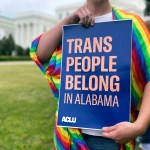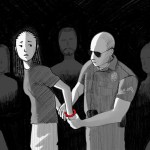Topic
Justice
On This Topic
-
Calls for Sonia Sotomayor to retire are 'ableism, pure and simple,' advocates say
Commentators have recently singled out the Supreme Court justice, who has type 1 diabetes. Disability leaders say it's not a reason for her to resign.
-
Law enforcement keeps making women remove hijabs for mugshots
Three women in Dallas are the latest to file lawsuits citing a failure to protect religious liberty during the booking process.
-
Survivors sidelined: How Illinois’ sexual assault survivor law allows hospitals to deny care
Illinois hospitals routinely skirt one of the nation’s strongest laws protecting victims of sexual assault.
-
Florida Supreme Court approves abortion restriction — and ballot measure that would overturn it
The court paved the way for a six-week ban passed in 2023 to take effect.
-
Even where abortion is legal, people in jail face huge barriers
New reviews of jail policies in 13 states found vague, confusing or nonexistent guidelines and major hurdles to obtaining an abortion.
-
How the imagery of White women victims is being used to stoke anti-immigrant fear
The death of Laken Riley, who Trump called “an American daughter,” is at the center of Republicans' hard-line immigration pitch to voters.
-
‘I’m in the room, I’m on the court’: Minnesota’s first Black chief justice talks about the importance of representation
Natalie Hudson spoke with The 19th about the changing face of leadership in her state, and the importance of making space for yourself.
-
Alabama judge unseals report accusing top LGBTQ+ rights attorneys of improper judge shopping
The report is related to lawsuits brought against Alabama’s 2022 ban on gender-affirming health care for trans youth.
-
Fani Willis’ office can proceed with Trump case if the special prosecutor steps aside, judge says
The Fulton County district attorney’s relationship with Nathan Wade did not disqualify her, the judge said, but gave an ‘appearance of impropriety.’
-
HIV is no longer a death sentence. But states still have laws targeting people who live with it.
Over the years, critics say, these laws have become another tool to criminalize Black people, LGBTQ+ people and sex workers.









